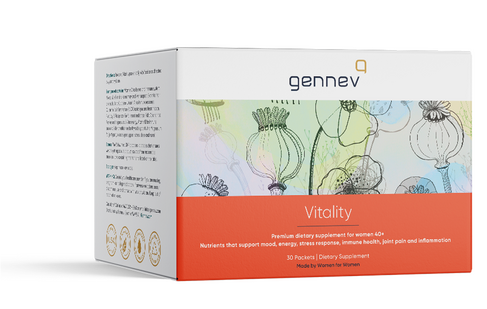What are the menopause types and why are they important?
Ask most medical professionals when your menopause transition will start, and they’ll likely give you the same answer: “It depends.”
And that’s true, it does depend on a whole lot of things, including genetics and diet. But it’s not a very helpful answer.
So Gennev’s CEO Jill Angelo and Chief Medical Officer Dr. Rebecca Dunsmoor-Su designed Gennev’s Menopause Assessment to help women be better informed about menopause, where they are in the transition, and how to manage the symptoms.
Your answers to the Menopause Assessment will tell us which of the five Menopause Types you’re in, based on where you are in your Menopause Journey.
Type 1
If you’ve taken the Menopause Assessment and tested as a Type I, probably the most important things to know are (a) yes, some changes are starting to happen; (b) they’re normal and not in your head, and (c) this is an excellent time to start preparing for what’s ahead.
In this phase, your periods are probably changing: you may be experiencing periods coming closer together, with worse PMS and cramping. Later in Type 1, periods can occur farther apart, be heavier, and you might even start skipping some.
You may have gained a pound or two from hormonal weight gain or find it harder to lose the extras that creep on. You may have had some menopause hot flashes, and particularly if you’ve had vaginal births, you may have some urine leakage or urgency. Sleeplessness, mood swings, and low energy are also very common.
Your final period is probably a few years away yet, so you’re in “premenopause” “ your hormones are fluctuating and not always on a predictable monthly cycle.
How we can help
To make life easier, we recommend that you do the following:
- Start or maintain a really good health regimen. The right nutrition, exercise, and sleep habits will make the transition so much easier, but fatigue can make it harder to stay on the right track. We also recommend finding a really good supplement to support your new, healthy habits. Gennev’s Vitality pack for menopause fatigue is formulated for women, filling nutritional gaps as your body’s needs change. Formulated by a naturopathic physician, Vitality is great for sleep, pain relief, immune health, mood, and energy.
Have you tried Gennev’s Vitality Supplement?

Did you know that as women, our ability to absorb nutrients starts to decline at age 40?
Gennev Vitality is a new multi-vitamin supplement for women ages 40+ that’s packed with nutrients that support mood, energy, stress response, immune health, joint pain and inflammation.
- Talk with other women. In the past, we’ve all been discouraged from sharing information about menopause, even with other women! But joining a community of women who have been-there-done-that. Whether it’s increased menopause anxiety or weird, unexplanation sensations, we’ve got you covered! Have a question for a menopause coach or doctor? Join Gennev’s Community forum today.
- Talk with a menopause-specialist OB/GYN to help level out your hormones month-to-month.
- Get a bone density (DEXA) scan to establish a baseline.
- Keep up regular well-woman checks.
- If you have a family history of breast cancer, talk with your doctor about getting on an annual schedule, if you’re not already.
Congratulations on starting your menopause journey informed and prepared! Gennev is here to be your menopause team every step of the way.
Have more questions about Type 1 or menopause generally? Join the conversation on the Gennev Community forum! Haven’t taken the Menopause Assessment yet? Find it here.
